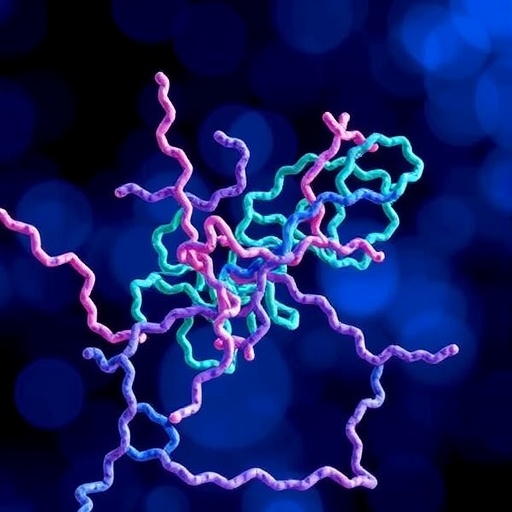In a groundbreaking study published in Scientific Reports, researchers have embarked on a journey to uncover the intricate connections between type 1 diabetes and hypoglycemia awareness. This research, led by Varkevisser and colleagues, has spotlighted the role of agouti-related protein (AgRP) in the delicate balance of glucose metabolism and its implications for individuals suffering from diminished hypoglycemia awareness—a condition that poses significant risks for severe hypoglycemic episodes. The implications of these findings could be transformative, both for the scientific community and for patients grappling with the daily challenges of managing their condition.
The significance of this research cannot be understated, as hypoglycemia awareness is a crucial protective mechanism for individuals with diabetes. Those who lack awareness are at heightened risk of experiencing severe hypoglycemic events, which can result in detrimental physical and cognitive effects. The study utilized targeted proteomics analysis to identify biomarkers that could shed light on this phenomenon, seeking a clearer understanding of how physiological signals can become disrupted in type 1 diabetes.
AgRP has been long known for its role in appetite regulation and energy balance, but its specific involvement in diabetes-related hypoglycemia awareness raises vital questions about the interplay between energy metabolism and glucose homeostasis. The researchers conducted a comprehensive examination of circulating AgRP levels in individuals diagnosed with type 1 diabetes, carefully comparing those with normal hypoglycemia awareness to those who reported impaired awareness. This comparison revealed a significant decrease in AgRP levels in patients with impaired hypoglycemia awareness, suggesting a potential link between this peptide and the neurocognitive mechanisms at play.
This research opens a new chapter in understanding how hormonal signals can alter awareness and physiological responses to falling glucose levels. The eroding ability to recognize low blood sugar can stem from a range of factors, and AgRP may be one critical piece of the puzzle. By pinpointing lower AgRP levels in individuals with impaired awareness, the study raises the possibility that targeting this pathway could provide novel therapeutic strategies to restore awareness in patients.
Future research could pivot towards exploring whether increasing AgRP could offer a protective effect against hypoglycemia, potentially leading to interventions that may benefit those with type 1 diabetes. Moreover, the therapeutic implications of AgRP extend beyond mere awareness restoration; they could influence hunger regulation, energy expenditure, and overall diabetes management. Thus, the potential impacts of these findings stretch across multiple dimensions of health, requiring a multidisciplinary approach to fully grasp their significance.
Another noteworthy aspect of the study is its innovative methodology, employing state-of-the-art targeted proteomics techniques. Through this approach, researchers could accurately quantify and characterize the plasma levels of AgRP among participants, contributing significantly to the body of knowledge surrounding diabetes pathology. Targeted proteomics enables a deeper understanding of the protein landscape in disease conditions, further underscoring the potential for proteomic signatures to serve as biomarkers for clinical outcomes.
As we navigate this rich tapestry of research, it becomes imperative to consider how these findings resonate with existing knowledge in the field of diabetes. Prior studies have suggested that neuropeptides play a significant role in glucose regulation through various mechanisms, including modulation of food intake and influence on pancreatic function. The current study aligns with and extends this understanding by spotlighting AgRP as a novel player in the hypoglycemia awareness debate, reinforcing the need for relevant neuropeptides to be scrutinized in the context of metabolic health.
For individuals living with type 1 diabetes, the practical implications of lower AgRP levels could be acute. With enhanced understanding of the biochemical pathways involved in hypoglycemia awareness, future strategies may drive the development of therapeutic molecules or guidelines aimed specifically at modulating AgRP levels. Such targeted interventions could equip patients with better tools to navigate their daily lives, mitigating the risk of severe glycemic events and advancing overall diabetes care.
The collaboration among researchers in this study emphasizes the importance of interdisciplinary dialogue. Insights from endocrinology, neurobiology, and metabolic engineering coalesce in a manner that can inform both clinical practice and research pursuits. Engaging with diverse expertise enables a more holistic approach to addressing the multifaceted challenges faced by individuals managing chronic conditions like type 1 diabetes.
In closing, the reported associations between AgRP levels and hypoglycemia awareness present compelling evidence that calls for an urgent reevaluation of existing paradigms in diabetes care. As further investigations expand upon these initial findings, there is immense potential for significant breakthroughs that may not only alter the landscape of diabetes management but also improve the quality of life for countless patients. Awareness, treatment, and ultimately the safeguarding of health outcomes hinge upon such discoveries, making this research a vital step toward a better understanding of type 1 diabetes in the context of neuropeptide signaling.
By embracing the complex mechanisms at play in type 1 diabetes, researchers and healthcare providers can work together to create an informed and responsive framework. Understanding signals like agouti-related protein not only fosters hope for new treatments but also embodies the essence of scientific inquiry—unearthing the unseen connections that define health and disease. As research continues to evolve, collaboration remains key to addressing the ongoing challenges faced by the diabetes community and unveiling the potential for innovation in treatment paradigms.
Subject of Research: The role of agouti-related protein in hypoglycemia awareness among individuals with type 1 diabetes.
Article Title: Targeted proteomics analysis in type 1 diabetes identifies lower agouti-related protein levels in individuals with impaired hypoglycaemia awareness.
Article References:
Varkevisser, R.D.M., Petrera, A., Hauck, S.M. et al. Targeted proteomics analysis in type 1 diabetes identifies lower agouti-related protein levels in individuals with impaired hypoglycaemia awareness.
Sci Rep 15, 36448 (2025). https://doi.org/10.1038/s41598-025-20491-y
Image Credits: AI Generated
DOI: 10.1038/s41598-025-20491-y
Keywords: Type 1 diabetes, hypoglycemia awareness, agouti-related protein, targeted proteomics, biomarkers, neuropeptides, glucose metabolism, metabolic health.
Tags: agouti-related protein rolebiomarkers for diabetes managementcognitive effects of hypoglycemiadiabetes management challengesenergy balance and diabetesglucose homeostasis disruptionglucose metabolism in diabeteshypoglycemia awareness mechanismsimplications of diabetes research findingssevere hypoglycemic events risktargeted proteomics in diabetes studiesType 1 diabetes research





